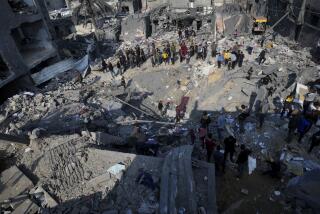Iraq Still Developing Nuclear Arms Arsenal : Weapons: A ‘very aggressive’ program may turn out a warhead in three to five years, Israeli experts say.
- Share via
JERUSALEM — Iraq may still be three to five years away from producing a deliverable nuclear warhead, Israeli experts say, but it has already developed missiles that can reach targets throughout the Middle East.
Iraq’s President Saddam Hussein, they say, is embarked on a “very aggressive” nuclear weapons program.
“Hussein is trying to acquire all kinds of technology transfer from abroad to develop Iraq’s nuclear weapons capability,” Dr. Dore Gold said at the Jaffee Center for Strategic Studies at Tel Aviv University. “We at the center think that it will take at least five years to obtain that nuclear capability.”
Once Iraq has such weapons, Gold said, it will “be able to assert enormous power with its huge conventional forces, because it will have a nuclear deterrent against other nations.”
“A major reason Iraq wants high oil prices--and Kuwait’s oil,” he said, “is to finance a crash nuclear program. It is a very aggressive program.”
Another Israeli strategic thinker, Prof. Gerald M. Steinberg of Tel Aviv’s Bar-Ilan University, suggested that Iraq could have a nuclear weapons capability in as little as three years.
“They are making an all-out effort at development facilities spread around Iraq,” he said.
Iraq has converted its Soviet-supplied Scud missile, which has a range of about 175 miles, into a weapon with a much longer range. According to military analysts here, Iraq’s Scuds are capable of delivering a warhead to targets up to 1,000 miles away.
Israeli experts say Iraq’s nuclear program is being carried out on a catch-as-catch-can basis, with the government seeking to develop some nuclear components locally and buying whatever it can on the international market.
Intelligence sources in Israel believe that Iraq is trying to build a centrifuge to produce uranium fuel and at the same time looking for ways to produce plutonium with reactors. Uranium and plutonium are both used in nuclear weapons.
Iraq’s major effort to develop a nuclear missile capacity was set back dramatically in 1981, when Israeli bombers destroyed the French-built Osirik reactor south of Baghdad.
Sources here believe that even with French assistance--and, ironically, Saudi Arabian financing--the Osirik reactor is still not in operation.
Iraq has two smaller research reactors, sources in Israel say, but it is questionable whether they could produce any plutonium.
Hussein is believed to have set up centrifuges in various plants to separate out enriched uranium. The machinery is believed to have been obtained from Brazil and, possibly, West Germany. But experts here think this equipment has not produced enough enriched uranium to build a nuclear weapon.
According to Western sources, Iraqi buyers have been trying to acquire weapons-grade fuel and other components for nuclear arms, including trigger mechanisms and a guidance system. Some material is thought to have been delivered by means of diplomatic shipments from Iraqi embassies.
Forty tiny trigger mechanisms, known as krytrons, which can be used to detonate nuclear devices, were seized earlier this year at London’s Heathrow Airport. Similar equipment, all consigned to Iraq, had been confiscated earlier in incidents cases involving Israel and Pakistan.
Last year agents of Iraq attempted to buy vacuum pumps and special steel used to enrich uranium into weapons-grade fuel.
Prof. Steinberg said: “(Hussein) is trying to get his hands on every piece of equipment he can. Whatever works he will take, and try to set up facilities in Iraq.”
Several European companies have helped Iraq in its effort to obtain nuclear technology, Western experts say. And if Iraq could import enriched nuclear fuel, they say, it would be well on its way to building a weapon. But they say that international inspection techniques have made it increasingly difficult to move such materials across international frontiers.
Israeli specialists believe the Jewish state’s intelligence resources--aided by the electronic facilities of the United States--are good enough to reveal in advance when Iraq would be close to producing a nuclear weapon.
The question raised in Israeli political and military circles is, what then?
“The situation has changed considerably since our air force attack in 1981,” a general at Israeli defense headquarters in Tel Aviv said. “Iraq has the capability to retaliate against another such Israeli strike with missiles loaded with chemical warheads. It is difficult to decide what we would do but, be assured, we would respond in some way.”
As Steinberg sees it, “Israel would probably pay a significant price to prevent Iraq’s becoming a nuclear power.”
More to Read
Sign up for Essential California
The most important California stories and recommendations in your inbox every morning.
You may occasionally receive promotional content from the Los Angeles Times.













